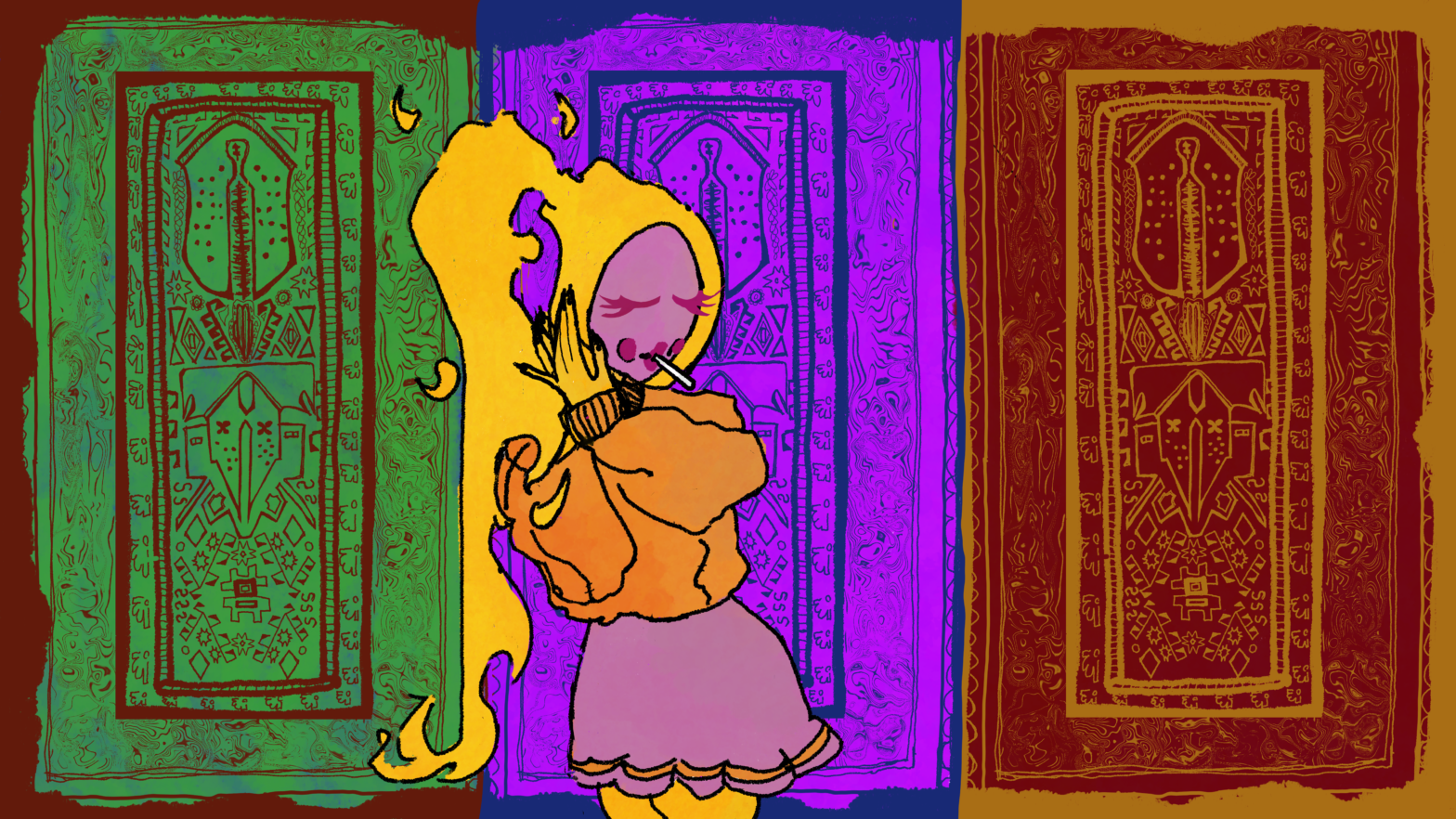GetLit is a semimonthly series featuring works of fiction and creative nonfiction submitted by New School students. Each month has two opportunities to submit: an open call and a themed call. To submit your work or find more information, please visit GetLit’s submissions form.
November’s theme was “Thank you, next.” This month’s themed call selection is “Rugs and Revelations” by Aadvika Gupta. While the theme is one entry point into Aadvika’s piece, it is not all-encompassing. The piece goes on to explore culture, colonization, people bonding, and unexpected interactions.
Aadvika Gupta (she/her) is a third-year student pursuing a dual degree in Journalism + Design and politics. With a background that spans across New York, Dubai, India, and New Zealand, she brings a global perspective to her writing. Aadvika is passionate about storytelling that dives into culture, politics, and the intersection of history and personal experience. She writes about almost everything from everyday encounters to larger societal issues, giving voice to the depth in seemingly simple moments.
I’m a hardcore cheater. I cheated on Heriz with Kashan. Then, just moments later, I found myself smiling at Meshad. Next thing you know, I was drooling over Sarouk, and don’t even get me started on the feelings Hamadan stirred in me.
See, that’s the thing about Persian rugs. They have this magical ability to make all my morals, principles, and ethical codes vanish. All I can imagine is sinking into a Persian rug, sipping coffee from a white porcelain mug, with ghazals1 softly playing in the background. It feels almost scandalous, like an irresistible affair.
But let me be clear. Not just any Persian rug will do. It has to be one from Mr. Hamid or Mr. Majid at Kermanshah down on 5th Avenue. Their rugs have stories that go beyond mere craftsmanship.
I walked into the store on a Monday with no intention of buying a rug. I’m still apartment hunting in New York, but I keep an eye out for antique jewelry or anything old and special. I’m a collector, a hoarder, and I’m not sorry about it.
I came for the antiques; I stayed for the conversation.
I was greeted by a man who was slightly older than me but not quite an uncle. His name? Angel. And truly, Angel was an angel. He introduced himself as Mr. Hamid’s apprentice.
What unsettled me profoundly was Angel’s unsettlingly profound knowledge of Hinduism, Indian temples, and architecture. Though he was half Portuguese and half American, his understanding of India’s golden heritage was disquietingly accurate. For once, I encountered someone outside my own culture who truly understood and valued the richness of my homeland’s history. As he spoke of the marvels my ancestors created, I was overcome with awe. I thought to myself, “This conversation right here is a rare and precious collectible.”
Shortly after, Angel introduced me to Massoud ji.2
Massoud ji, a Pakistani who has been living in New York for 25 years now, is also a part of the Kermanshah team. Our shared love for the rich and aromatic pleasures of our erstwhile culinary homeland naturally steered our conversation towards mutton biryani.3 I confided in him my wistful dreams of visiting Lahore, despite the extreme political tensions that divide our countries. Talking with him made me realize that if colonizers hadn’t left our homes plundered and created a rift amongst us, we’d all “go back to where we came from.” No outsider would need to point it out.
Massoud ji’s green eyes reminded me of my Nanu’s4 — he was also born in what is now Pakistan-occupied Kashmir. We swapped stories about home and I had found another keepsake.
While I was snapping photos of the rugs to show my younger sister, I kept hearing “balehs” and “nakheyrs” (yes and no in Persian). I asked Massoud ji who was speaking, and he told me it was Hamid ji and Majid ji. I imagined the rugs would take on even more character with their faces in the photos. So, I asked Hamid ji and Majid ji to stand together and smile for my camera. When I asked if they were brothers, they lit up with pride and said yes.
I mentioned I didn’t have an apartment yet and apologized for taking their time. Their response was warm and reassuring: “The rugs are waiting for you right here.” There it was, my third priceless collectible.
In that moment, surrounded by those beautiful rugs and real conversations, I realized how powerful it is when different cultures collide in unexpected ways. New York, with its endless mix of backgrounds, becomes a place where stories of broken homes, migration, and colonialism come together. Each rug at Kermanshah tells a story, but it’s the people who make it all truly special.
I came for Kashan, Meshad, Sarouk, and Hamadan. But I stayed for Hamid, Majid, Massoud, and Angel.
- (in Middle Eastern and Indian literature and music) a lyric poem with a fixed number of verses and a repeated rhyme, typically on the theme of love, and normally set to music. ↩︎
- In India and Pakistan, people add the suffix “-ji” to the end of a name to show respect to elders, regardless of the person’s gender or relationship to the speaker. ↩︎
- Mutton biryani is a dum cooked, aromatic rice dish made with layers of tender goat meat, fragrant basmati rice, deep fried onions and aromatic Indian spices. ↩︎
- Term for Maternal Grandfather in Hindi and Urdu ↩︎








Leave a Reply